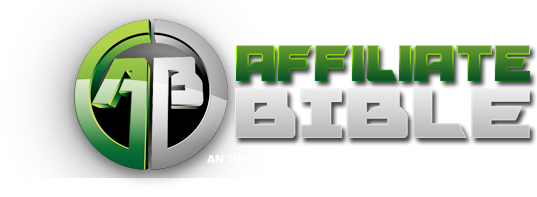Yes I’m still alive!
Hope everyone is well. I don’t write on Affiliate Bible too often anymore. The reason for that is I only really write here these days when the motivation strikes me. I use it almost as an outlet for my inner monologue, or after having a discussion with another affiliate that inspires me to write on a particular topic.
I COULD fill the site up with affiliate program reviews and targeting specific webmaster related keywords. However honestly my goal with this site was never to really monetize it or profit from it. It’s always just been an outlet for my writing in the affiliate world. So you may still occasionally hear from me – just don’t expect regular articles or anything.
In saying that you can shoot me an e-mail at dan@dealerdan.com if you just want to chat, or if there is a topic you do want me to write about. Or if you want me to give my opinion on an affiliate program.
I work with very few affiliate programs these days. Quality over quantity. I much prefer working with platforms that have a lot of crossover opportunities too such as OlyBet Sports. Not only do they have a casino, sports betting, esports and poker – but they have the Olybet Club which is essentially a rewards program. It’s for high value players and is invitation only but that sort of thing can really encourage people to play more etc.
That’s something worth looking out for when looking at a property to start promoting. Not too many people consider rewards programs when picking a casino or sportsbook to promote but they can be huge for retention.
I’m writing today because I AM motivated about a certain topic. It’s actually a common issue a lot of webmasters encounter and unfortunately the mass, mass majority of them go about it the wrong way (myself included). That topic is Partnering with a Friend.
Now this is something I could go on and on about for hours and there are a lot of specific situations you may find yourself in. So if you have any questions etc be sure to e-mail me above and I can do a follow-up article getting into specifics. For now it will be more generalized although I’ll try and add examples when possible.
Let’s get into it:
What Am I Talking About Exactly?
I’m talking about either partnering up with a friend to start a new website, or partnering with a friend on an existing website.
You’re an affiliate. You’re an established affiliate. You make money by sitting at home and creating websites. Your friends hear about this. They think about how cool it is, and they also want to create websites with you.
Maybe they come to you with an idea for a website. Or maybe you have a mutual interest in a topic and the idea of a website comes from that.
For example I launched the website BetNHL.ca with one of my best friends, Scott, in that manner. We went out one lunchtime for wings and beer. While at lunch, it was announced that the NHL 2012-2013 lockout was over.
We are both big NHL fans, and he had expressed interest in getting into the webmaster game. One thing led to another, and the next thing you know BetNHL.ca was born.
So that’s what I’m talking about; starting a partnership with someone who has never done any sort of online work or marketing etc and how to best go about that.
There are a lot of problems that occur when you work with a friend. I’ve partnered with many people over the years. If you’re one of those people and are reading this – don’t take anything said here personally! It’s been a huge learning experience for me, and I’ve made a lot of mistakes in the past.
I still partner and launch new websites with different friends to this very day. However over the years I’ve learned what I feel is the optimal process for that, and I’m going to share it with you here.
Test Them Out First
The idea of sitting around at home on a computer earning money is great – however in practise, a lot of people just can’t handle it. They get bored or they get distracted. Or they find out they just aren’t suited for this type of work.
They may also be strong in one area, however weak in another. It is important to determine that early on, and so I like to give people some tasks on my existing websites first to test that out.
The first thing I like to do is give them a really menial task to do. Something dull right off the bat to let them know that this work isn’t all bells and whistles. That there’s a lot of grunt work required.
One example is for my website BetSoccer.ca. I tell them to create fixture lists for the English Premier League or Serie A etc, in 5 different timezones. To create it in spreadsheets, and then send it to me. I pay them a fixed amount for this process.
Another example is for Slotslistings.com. This website lists all online slots with basic data such as reels, paylines etc. So it’s a case of getting them to fill in all that data also in a spreadsheet, or if I have the data already asking them to fill it in on the backend for about 100 slots.
This is boring work, so if they are able to deliver it without complaint then it’s a good indicator they’re suited for this type of work.
I also use this to learn more about how they work.
I give them a general outline and an example of what I want then I sit back and see how they handle it. If they ask any questions. If they do this work the long way or the short way. Basically there are always shortcuts to the work, and I like to see if they’re able to figure them out. If they’re able to think outside the box or not.
This is a great first test to see whether they can do this work or not. As an example – I had one friend wanting to launch a trivia app with me. He was very excited about the project and was throwing out all these ideas. He was also completely broke, and was looking for a way to earn money.
So I gave him one task – to come up with 50 trivia questions on the topic and put them in a spreadsheet, with multiple choice answers. This dude is just sitting at home all day so it should be something he could turnaround in an hour or two max. After three days I asked him the status of it and he hit me with excuses. 3 days later he sent me a spreadsheet with just 12 questions in it.
That was obviously a big “NOPE!” from me. However I don’t hold anything against him; I just felt he wasn’t set out for this sort of work based on this. Lots of people will be “all talk” but actually can’t sit down and do the work when required. It’s just the way it is.
Give Them Tasks Related To The New Website/Project:
If the person has passed the first hurdle, then it’s time to see if they’ve got what it makes to help you run a website.
Now it’s quite possible that you might end up with an admin/employee type role instead, even if they are your partner. Perhaps all they do is the content writing, and you handle everything else. In that case this section really isn’t applicable, even if it IS a 50/50 partnership.
However it’s still good to get an idea of what they can bring to the table. Whether they are going to need their hand held throughout the process, or whether they’re able to work on their own.
I’ll start with vague tasks, then get more specific. A common one will be to tell them to come up with a list of content for the site. To get keyword ideas and a list of potential articles and topics we cover.
I’ll usually set a vague amount like “at least 50” then leave it to them to work on it. I then pay attention to how they communicate to me.
Some may not communicate with me at all. That can be good or bad. Usually bad. Some may immediately get the deer in headlights look, and ask me “how to do that”. They’re more of the hand holding type (and that’s fine). Others will ask me if I have any resources I’d recommend to come up with ideas etc. That’s what I like to see.
All of this helps me figure out what type of person they are, and helps me understand the workload down the road.
I have some people who I partner with on websites where they handle all the content. One of those friends is the “deer in headlights” person. I can ask them to write anything and they will – but I need to set up an extremely clear template for them to use. I have to be very specific as to what I want.
Others I can give vague topics to and they know what to do. They’ll even throw out ideas etc to me. I get to learn what type of person they are early on by giving them these tasks. It stops growing pains in the relationship from happening which means you can get going that much faster.
It also gives me a strong idea of what they can bring to the table from an ideas and work ethic perspective. If I ask for “at least 50” articles and they send me exactly 50 or thereabouts, I get an idea of their creativity, work ethic etc. I then know that for tasks like that I have to be more “demanding” in terms of the work.
Give Them Tasks To Help Them Understand The Process:
These people don’t know search engine optimization, and they aren’t going to understand it overnight. However I think it’s very important to slowly let them know the process of running a website, and what factors it involves. Even if their duties are going to be content writing; it’s good to let them see things on the grand scale and so they can think independently.
So once we have the articles list, I’ll tell them to structure a site map based on that. How will people navigate the site? Put articles into categories etc. Formulate the website in their head. Then when they have did that, I ask them to look around and pick out a design for the site, or draw the design out on paper.
This is important to me as it’s good to see what they have visualized for the site when it is usually their idea. It’s also very important for them as picking out the right design is a tough process. There’s a LOT of factors to consider and it’s a fun way of getting them into that practise.
Again they may struggle with this concept or just not be up for doing it at all. That just helps me learn more about them as a potential partner. Depending on the topic of the website, I may get them to participate in the actual process that our visitors would be doing. For example if it was a website dedicated to online slots I’d get them to play slots online to get to understand the demographics better.
Set Responsibilities:
One of the most important things you can do is set responsibilities for each person. There are a lot of tasks in regard to running a website. Link building. Social marketing. Content writing. Website administration. Website tech. etc etc.
It’s important that all of this is outlined at the beginning. Don’t be vague about it; be specific in regard to what website task falls under each person. A lot of the previous work should have helped you in regard to knowing what they are capable of, and what they can take care of.
If they show a lot of creativity for example, I’ll give them some pointers but give them the “social marketing” task and let them have at it. If they are more the hand held group, I might still give them social marketing but with a list of specific tasks to do each day.
Either way be sure to set out who is responsible for what. Then put in a contract. More on that in a second. First….
(Optional) Pay Them Initially:
Look – creating and running a website isn’t always a goldmine. I’ve had as many failures as I’ve had successes. Hell I’ve probably had more failures. For whatever reason things just don’t always pan out. Even if you do anything right.
I have one website I launched a few years ago that had an initial investment over its first 6 months of $40,000. That website is still in existence today. Its net profit each month this year? About $120-$150. We’ve cut as much monthly costs as possible but it’s going to be in the red until my grandchildren have their grandchildren and they’re all living on a new planet.
I’ll tell people this and that prepare them for that – that this might not work out. They might work hours and hours a day for absolutely nothing. That’s the way it is, unfortunately. Most of them will say they are prepared for that. However when they are on month 4 or 5 suddenly it’s a bit more difficult to write that 1,000 word article, or interact with those tweets when there is nothing to show for it financially, and the traffic is barely trickling in.
So one option is to pay them. I explain to them upfront that I am not sure if the website will make money or not, but I’m willing to risk paying them a salary if they do the work required. It’s usually a small amount. No real specifics if you’d pay $50-$200 for a 1,000 word article off a freelance content writer, then you’d pay them something like $15. Enough that you’re not breaking the bank, and enough that hey at least they’re making something off their hard work.
I also make it clear that this income is temporary based on the actual income of the site, and that it is a debt that will be paid off from any future earnings of the website. Although if there are no earnings on the website or not enough, the debt is forgotten.
Now onto the most important thing of all when partnering with a friend….
Create A Very Very Very Very Very Detailed Contract:
This has been my biggest mistake over the years – not creating a detailed contract with people. I mean they’re your friends so it can be a bit weird mixing “personal” with “business” but it is extremely important that you do this.
This contract should cover EVERYTHING. It should cover the responsibilities of each person in fine detail. Are you each going to write 5 articles per month? That should be in there along with details in regards to the word count of the articles. Is their job each day to follow 10 people on Twitter whose interests match your website? That needs to be in the contract.
It should also cover all of the income of the site. How its divided between you, how much is going back towards the website on certain expenditures, any future plans such as outsourcing work etc. Of course you don’t want to think too far ahead – topics like that should be covered but can state that they are to be determined at a future time etc.
Most importantly it should factor in what happens if one person doesn’t fulfill their duties, and details in regard to a buyout or dissolving the partnership.
Remember above when I said that often after a few months of not making much or any money, it’s easy to lose interest? It’s also easy to lose interest even WHEN the person is making money! Many years ago I partnered with a friend on a website. Everything worked out well for a year and the site was making money. Suddenly they started doing tasks late or not at all. Then they literally disappeared from the internet and stopped responding.
So I ran the site myself for 6 months. I still sent them their share for a couple of months then I stopped. 4 months after that they popped up. Turns out they got seriously addicted to World of Warcraft and that just consumed them. Aight – shit happens. I get it. I wasn’t happy but I know how addictions can be.
However the big problem is that they expected to be paid money for the last 4 months even though they didn’t freaking do anything!!! I’d been working my ass off running the site while they were pissing in a bottle in their bedroom all day long and they still expected to be paid the money.
Of course we had no contract; no plans in regard to what would happen should this situation arise. This was back when I was naive and I just assumed we shared the same work ethic or that nothing would come in the way of the site. So it caused major issues.
I do a combination depending on the project and the person. It may be a “three strike” process where if they fail to complete their responsibilities three times, the partnership ends right there and then. Others may be docking their pay for that month (50% instead of 100% – gotta be strict) and they must make it up the next month or there will be penalties.
Of course some leniency is required too. If someone runs into a serous personal or family situation or ends up in the hospital for a month, it’s not really great docking their pay. However situations like that need to be discussed, with the terms and solution to it written into the contract.
I had a similar situation with someone else where they just wanted to stop working on the website even though it was making money. They wanted me to buy them out but the amount was ludicrous. It was a website grossing $1,000 a month and they wanted me to buy them out for $100,000 based on the “potential” of the website. Of course we had nothing in the contract about buying each other out (should have had an x months of gross or net income) and so that caused issues.
I suggested we use a neutral mediator to figure things out. That’s another thing that you may want in a contract; in the instance of conflict you can offer up going to a mediator where their design is final. In this particular instance the mediator set what was a fair price, and my friend just said “NOPE” and demanded the $100k.
To no surprise, I lost a friend over that. And a contract would have stopped that from happening.
Summary:
Partnering with a friend to run a website may sound exciting, but there are so many dangers and potential problems. The biggest one is that you can lose friends over it, or your friendship won’t be the same. It really is hard to separate the personal and business sides of relationships.
If there’s one thing you take out of this article it’s this: get a bloody contract written. Yes it can be a pain and it can be awkward proposing this to a friend. You may think “it will never happen” or “we share the same work ethic” etc but I can tell you that in 99% of the time that is just not the case. however over my 20 years of affiliate marketing, I can tell you it is the most important thing you can do in a partnership.
You won’t just miss out on running a successful website; you’ll lose a friend too.

 Dealer Dan, pictured here with WWE Superstar Mick Foley, has been in internet marketing since 1996. He likes hugs, long walks on the beach, and making money while wearing his jammy jams. For more information, you can read all
Dealer Dan, pictured here with WWE Superstar Mick Foley, has been in internet marketing since 1996. He likes hugs, long walks on the beach, and making money while wearing his jammy jams. For more information, you can read all 












